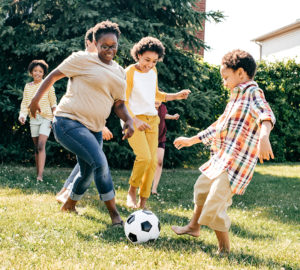Children’s Mental Health Warning Signs To Watch For

Nearly every week, we read new headlines about the mental health crisis putting young people at risk. As more doctors see mental illnesses manifest themselves in childhood and early adolescence, it’s essential that parents and caregivers learn to recognize the warning signs and know when help is needed. While no one wants to imagine their child facing a mental health crisis, the right support can make all the difference. With an understanding of what might signal a call for help, parents can ensure their children receive the resources and support they need to navigate mental health challenges.
If you know a child struggling with their mental health, we’re here to help. Call us at (402) 880-4926 or fill out this form.
COVID-19, Connection & the Adolescent Mental Health Crisis
Larissa Dowe, KVC Nebraska Director of Clinical and Prevention Services, points toward the challenges of COVID-19 when it comes to rising children’s mental health concerns. “School is a safe haven for a lot of children,” she explains. “When they were removed from social interactions with peers and caring adults, those connections were severed.” While most students have returned to the classroom, the ripple effect of this is still deeply felt.
Connecting with others is critical to child development. Down to the neural connections made in the brain as children build relationships, this social component has a substantial impact on children’s mental health. And virtual classes just don’t help kids build the same connections. Isolation due to COVID-19 can increase anxiety and depression because a sense of community is one aspect that decreases those mental health issues.
Increased Need for Mental Health Support
Psychological research has shown that individualistic cultures, like that in America, can reduce wellbeing. In a collective environment, support and connection are received from a variety of individuals. If one person is overwhelmed and unable to provide complete support, another caring adult or child can assist. That level of support may have been lost as children were isolated in their homes due to the pandemic, with caregivers who were also feeling overwhelmed. Going from isolation to reintegration as schools opened up didn’t necessarily solve the problem. Because children were lacking that level of connection, they are now experiencing a lot more social anxiety.
Rates of suicidal thoughts, suicide attempts and hospitalization due to suicidal ideation have all increased over the past few years, too. According to the CDC, nearly one in five children ages 14 to 18 reported having seriously considered suicide in 2019. There has been a 31% increase in visits to hospital emergency departments for mental health-related crises, compared to before the pandemic, for children ages 12 to 17 years.
“I believe a lot of that comes from loneliness and disconnect from peers or caring adults,” said Larissa.
Children’s Mental Health Warning Signs
Children and teens may have trouble expressing how they’re feeling so it’s important for caregivers to watch for these changes in their child’s behavior or physical wellbeing. Many of the signs you’ll see depend on your child and their typical behaviors.
- Increased anxiousness, sadness, irritability, anger or aggression
- Extreme mood changes
- Feeling hopeless
- Excessive crying
- Fatigue or reduced energy
 Unexplained headaches or body pain
Unexplained headaches or body pain- Changes in sleeping and/or eating habits (including sleeping or eating too little or too much)
- Difficulties paying attention and concentrating (including forgetfulness and distraction)
- Spending more time alone in their room
- Avoiding family and/or friends
- Not enjoying or being excited about activities or hobbies they used to like
- Returning to outgrown behaviors (for example, thumb-sucking or bedwetting)
- Dangerous behaviors or actions that could lead to self-harm or harming others
- Use of alcohol, tobacco, or other drugs
- Poor school performance or avoiding schoolwork
“If you notice any self-harm, such as cutting on your child’s arms or legs, that’s a big warning sign,” said Larissa. For other kids, internalizing can be an indicator. “They may not talk as much as they used to or don’t seem as excitable as in times past. That would be an area of concern.”
What Caregivers Can Do To Support Children’s Mental Health
Seeing mental health warning signs in your child can be concerning. If you’re worried about your child’s mental health, here are some steps you can take:
 Become a safe place. Even if your child isn’t struggling, this is a proactive step that can set the stage if struggles arise later on. Position yourself as a safe space for mental health conversations. This may mean beginning to talk about mental health from a young age. Having these talks can help your child trust that they can come to you.
Become a safe place. Even if your child isn’t struggling, this is a proactive step that can set the stage if struggles arise later on. Position yourself as a safe space for mental health conversations. This may mean beginning to talk about mental health from a young age. Having these talks can help your child trust that they can come to you.- Check in with the child. The first step if you notice changes is to talk to your child about what’s going on. Simply say, ‘Hey, you seem like you’ve been down recently. Tell me, what’s going on with you?’ Making that connection and listening is really important.
- Identify emotions. Sometimes, it’s not the child’s behavior that changes, but the parent’s perception. There’s a big transformation that happens when you perceive your child’s behaviors as trying to irritate or hurt rather than expressing something in their body. A lot of times, children express their emotions through their bodies. Giving words to emotions and sharing with children what they might be feeling is helpful because it’s not innate.
- Seek additional help. For young people who are struggling, it can be helpful to seek additional mental health services. If you live in Nebraska and your child is experiencing mental health challenges, call our Outpatient Therapy program at 402-880-4926. Our team will answer your questions and help you find treatment. You can also contact your primary care provider, local community mental health center, or the National Suicide Prevention Lifeline at 1-800-273-8255, or 988 in July 2022.
Why Relationship Building Is So Important
Creating an environment where young people are willing to listen and talk with their caregivers begins with building a relationship. If you have a child who you feel disconnected from, spend quality time with them. Be present in your time together with no distractions and really listen to what they’re saying or showing you.
“Make sure they hear praise,” said Larissa. “When kids misbehave, we as caregivers often feel lost and start to tell our kids what to do or what they’re doing wrong. We really have to flip it and notice the good.”
 Another element to building a positive relationship with your child is interacting with them at key times throughout the day. Try to connect with your child in those first five minutes of waking up, returning home from school and before going to bed. As we show love and care in these moments, caregivers build a protective factor that helps children feel a sense of belonging and respite from the stress of the world.
Another element to building a positive relationship with your child is interacting with them at key times throughout the day. Try to connect with your child in those first five minutes of waking up, returning home from school and before going to bed. As we show love and care in these moments, caregivers build a protective factor that helps children feel a sense of belonging and respite from the stress of the world.
Having those key interactions can start with a question. Sit on the edge of the bed and say good morning. Ask them about the best part of their day and the hardest part of their day when they get home from school. As they go to sleep at night, it could be reading a book or asking them a little more about their day. Quality time doesn’t have to feel overwhelming, and you can have quality time in just a couple minutes, a few times a day.
“Children really just want to be seen and noticed,” said Larissa. “That doesn’t mean they have to be judged. Picture a kid jumping off a diving board 25 times. They want you to notice their bodies and their behaviors. They don’t necessarily need you to say good job every time. Just noticing their bodies and their emotions is critical to their development.”
“Children really just want to be seen and noticed.”
Taking care of a child’s mental health is a journey. As you watch for these warning signs and seek to build your relationship, you’ll do your part to build a better future for your child. Click here to learn more about how you can access mental health treatment and help for your family.

